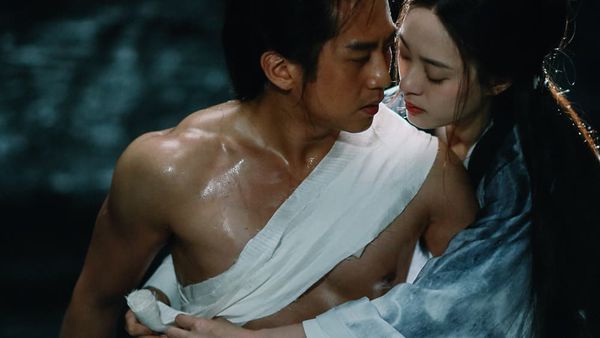Eye For Film >> Movies >> Shadow (2018) Film Review
Shadow
Reviewed by: Owen Van Spall

Chinese director Zhang Yimou is no stranger to fantasy-tinged historical epics featuring exquisitely designed martial arts set pieces: House Of Flying Daggers (2004), Hero (2002) and Curse Of The Golden Flower (2006) sit in his filmography. Shadow is very much of a piece with those films in that it boasts the requisite mind-blowing visual design elements combined with impressive feats of athleticism (wire-assisted at times) from an attractive and colourful cast. But it also shares the same weaknesses - namely a very busy plot and nonsensical character motivations that I struggled with at times.
It took me a while to get a grasp on the political situation facing the trio of main characters, the result of strange editing decisions and a screenplay that requires the cast dump lots of exposition on us early on. We are dropped into China's Three Kingdom's era (AD 220-280), where the neighbouring kingdoms of Pei and Yang are shown to be enjoying an uneasy accord. On one side, peace is maintained by Pei’s King (Zheng Kai), a vain, young kind of chap whose desire to never overstep his kingdom’s reduced boundaries after the last war, which left the city of Jing outside his control and in Yang hands, is shown to have ruffled the prideful feathers of his military leaders.

In a strange and, frankly, hard-to-understand plot device, the King’s chief military commander and advocate for retaking Jing, a guy called simply ‘Commander’, is revealed to be a ‘Shadow’ (Deng Chao, in a dual role); a lookalike raised since his stray youth to imitate the real Commander, who wastes away with a degenerative wound in a secret cave under the palace. When Pei’s Great Commander, AKA the Shadow, goes rogue and tries to start a war to retake Jing, the King is stunned at this insubordination, but both he and the Shadow can’t know that they are being manipulated to greater ends by the real Commander, whose wife, Madam (Sun Li), is pinned uneasily between his machinations and her feelings for the Shadow. She has come to care for the young-man-turned-duplicate, after years of pretending he is her real husband (she is the only other person in on the deception).
Opening text assures us that this strange state of affairs was commonplace once as, under constant threat of assassination, many nobles secretly employed surrogate men, known as ‘shadows’, who served their masters through impersonation, risking their lives and proving their loyalty by embracing death. Exactly why the king isn’t told his own chief adviser is a duplicate, and how long the real Commander expects to have to hide out in his dingy cave, isn’t revealed to us. The extent to which the resulting chaos that he masterminds wasn’t entirely clear to me either. You just have to go with it.
And going along with a bonkers plot and lashings of melodramatic confrontations between the characters is a hell of a lot easier to do when you have a well-done Wuxia spectacular to delight your eyes, with Zhang collaborating once again with House Of Flying Daggers cinematographer Zhao Xiaoding and production designer Ma Kwong Win to create an eye-popping visual design based on the colour pallette of ink brush techniques from Chinese paintings.
The costumes are sumptuous, with everyone in the Pei court decked out in flowing robes, which each boast their own unique ink designs. This predominantly black, white and charcoal palette is repeated throughout, from the grey, rain-drenched mountain ranges that surround the kingdom, to the slate floors and the calligraphy covered panels within. Water, and constant reference to the yin yang are in the mix too, with several duels taking place atop giant ying yang symbols etched into stone floors. Shadow and the army he assembles to retake his home city in the last act even develop a gleefully mad ‘feminine’ fighting technique (a style we see developed by the Commander’s wife, no less) that involves matching the Yang sword-staffs with…wait for it…canvas umbrellas.
And of course, we have fluid fight sequences taking place in the rain, in slow motion, because that has to happen in these epics. The performances are appropriately over-the-top, with particular credit going to Deng Chao in a dual role which requires him to be super-stoic in once scene as the commoner-turned-Shadow, then Machiavelli on steroids the next as the mad real Commander.
Reviewed on: 05 Nov 2018















